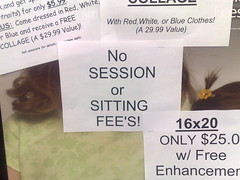
I’m fluent in English. I work for a newspaper. Given I edit a fair number of articles every night, I really hope my grasp of the English language is up to scratch. I’d like to think writing is one of my stronger skills, though I know that just invites others with similar skills to point out my errors.
I know the differences between you’re and your; it’s and its; their, there and they’re. I know increasingly useless stuff too, like the uses of “who” and “whom,” and already useless information such as “thou” versus “you.”
What I don’t know is why anyone would ever seek out an opportunity to correct someone else’s grammar.
Did you know American English is a modern language? That means it’s a language that is presently in use and therefore mutable. Compare this to, say, Latin or Gaulish, which are dead. These are incapable of change, because no one speaks them in conversation.
Merriam-Webster states that the way to get a word into the dictionary is through usage. If everyone started saying “crappy mappy” as an exclamation of discontent, it would eventually get put into the dictionary and incorporated as part of the English language. It’d be defined as slang, sure, but it’d be in there.
As a modern language, English is perfectly capable of, and susceptible to, evolution. If you think about it, it’s completely feasible that, one day, it will be grammatically correct to write, “Its snowing outside,” (assuming it still snows by then) or “Their waiting for us over they’re.” Maybe people will even use “are” instead of “our.” Crazy, right?
In all honestly, I hope not. But it’s not the worst thing that can happen. I’m sure there were people who lived in the 16th century who would be unable to suppress their rage at the falling out between modern English speakers and the informal you, “thou.” Imagine addressing a small child with the same level of respect as the queen! What do you mean she’s just a figurehead? Of course she still rules over the colonies…!
(It’s for the sake of everyone involved that I don’t butcher an attempt to “Shakespearize” those last few sentences.)
Things have changed since then, and I don’t think there’s anything to be gained from, say, France’s idea of strictly maintaining linguistic integrity. That doesn’t even work; words and phrases like “liker” (to like, in the Facebook sense), “sharer” (to share, also Facebook) and “c’est thug,” (that’s gangsta) have crept in through the internet, something I’m sure the Académie française did not approve.
And that’s not a bad thing.
Personally, I love languages. Moreover, I love the concept of language. But, to bring us back to my original point, I don’t love unsolicited corrections. I think that, unless someone either asked you to proofread something or is so utterly incomprehensible that you can’t have a conversation with them, there’s no need to correct them.
We’re in college, and if someone’s native language is English and they still haven’t figured out that you can’t use apostrophes for plurals, they’re not going to learn it because you got snarky at them on Facebook.
This isn’t meant to be a response to Lauren Stieritz’ column last week. I agree that spell check isn’t sufficient to cover all possible mistakes. This is a response to all the self-appointed grammar freaks on Facebook who don’t know how to prioritize.
If it bugs you that much, you can hide them from your feed. Or, if this is really important to you, you can download an extension on Google Chrome called Ponify. Invented for fans of “My Little Pony: Friendship is Magic” to change words like “everyone” to “everypony” for some inscrutable reason, you can fiddle with the settings to change “its” to “it’s” or vice versa. Given both are commonly used, I doubt this is a permanent solution, but maybe it can make you feel a little bit better.
Entertainment Editor Emily Kribs can be reached at entertainment@collegian.com.





